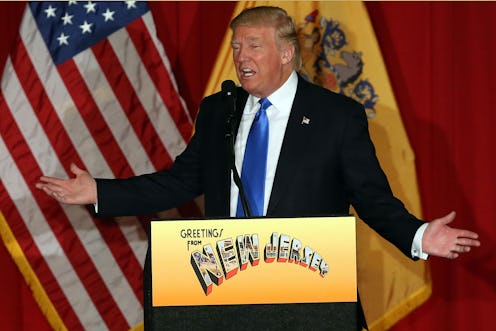News
Trump Might Be Losing Ground To Clinton
On the night of the very last election contest of the 2016 presidential primary season, it looked like Republican presidential candidate Donald Trump was losing ground to Hillary Clinton, his Democratic rival.
Beating out Vermont Sen. Bernie Sanders, Clinton handily won Tuesday's Democratic primary in Washington, D.C., making her presumptive nominee status all the more "presumptive." According to a comparison by RealClearPolitics, she could also win the coveted D.C. address in November's general election.
RealClearPolitics has tracked polling data for a Trump-Clinton match-up since July 2015. At first, Clinton held a strong lead over Trump, until he narrowed the gap by September of last year. In May, they polled almost evenly: On May 24, RealClearPolitics calculated that Trump's support was at 43.4 percent, while Clinton's was at 43.2 percent.
What's perhaps most interesting,and most relevant, is what has happened since May 24. Although Clinton's support has plateaued, Trump's support has dropped dramatically. On Tuesday, June 14, Clinton polled at 44.1 percent support, while Trump came in at just 38.6 percent support. RealClearPolitics' numbers are calculated as averages, based on polls from Bloomberg, Fox News, Reuters, Quinnipiac, and others. There are still months left until the general election, but the current averages definitely don't favor Trump.
RealClearPolitics doesn't speculate as to why Trump's numbers began to drop at the end of May, although there are plenty of incidents that it could point to. According to the data, Trump's support had risen for more than a month prior to that May 24 turning point; this could be explained by his two final Republican challengers, Texas Sen. Ted Cruz and Ohio Gov. John Kasich, dropping out of the race. So what happened after that to make Trump start to slip?
Again, the data doesn't offer any certain answers to that question, but the following controversies seem to paint quite a picture. First, on May 25, Trump and Elizabeth Warren had a Twitter feud that got pretty heated, with Trump calling her "Pocahontas" because of her previous controversies involving her Native American background. Then, on May 26, several media organizations reported that Trump had officially reached the 1,237 delegates he needed in order to claim the Republican nomination for president. In other words, Trump became a reality for the GOP; a reality that many Republicans likely weren't ready to face.
Almost immediately after claiming the Republican nomination, Trump waged one of his trademark wars of words against Gonzalo Curiel, a judge handling the lawsuits against Trump University. Trump spent Memorial Day Weekend blasting Curiel as "very unfair" and calling him a Mexican. (In case you missed it the first time around, Curiel is a U.S. citizen who was actually born in Indiana.)
Once Memorial Day Weekend came to a close, Trump found himself in hot water over those donations he had promised to make to veterans' organizations many months ago. (Reminder: Back in January, Trump boycotted a Fox News debate moderated by Megyn Kelly. Instead, he held a fundraiser for veterans' organizations, where he claimed to raise millions of dollars.) On May 31, Trump held a news conference to clarify where that money went, but it was unclear if and when veterans' groups got their checks.
Just a few days later, Clinton made some important moves of her own. She gave a speech on foreign policy that blasted Trump, calling his ideas "dangerously incoherent." Less than a week later, Clinton won decisive victories in California and New Jersey, clinching the Democratic nomination and officially becoming Trump's general election rival. At that point, Clinton had jumped ahead of Trump in RealClearPolitics' average, leading him by two points.
It makes sense why Clinton's support increased after clinching the nomination; President Obama has endorsed her, and Sen. Warren did the same. Clinton's spike in the polls could also come from supporters of her opponent, Sanders, who may be looking to rally behind their party's best chance for the White House.
This week, Trump has raised some eyebrows over his response to the tragic mass shooting in Orlando. He reminded Americans of his desire to ban all Muslims from entering the country, and he curiously thanked the LGBT community for its support. Not to mention, he revoked The Washington Post 's credentials on his campaign after the paper published what Trump called "incredibly inaccurate coverage."
As of June 14, Trump lagged behind Clinton by more than 5 percentage points. It's a narrow gap, but it's a gap that has been growing wider and wider in recent weeks. It's impossible to pinpoint a single reason for the decline, but with a candidate as controversial as Trump, there is no shortage of incidents to consider.
